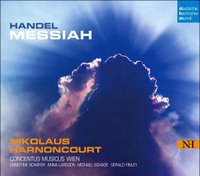New Messiah

After writing a biography of Handel for adoloescents, which followed not long after leading sections in a course called First Nights wherein important premieres throughout the ages were discussed, one of them being Handel's Messiah, not to mention being obligatted to hear the oratirio every season for years because some friend or another was singing (or, in my youth, I was playing the organ part on a synthesizer) I don't know what inspired me to listen to Nikolaus Harnoncourt's new recording on Deutsche Harmonia Mundi--I thought I never wanted to hear the piece again. Perhaps it was the presence of soprano Christine Schaefer, who I saw in every performance of Lulu several years ago at the Met...or perhaps, it being close to Thanksgiving, I was edging on the yuletide spirit. But lo! Even from the first notes of the "Sinfony" I was locked in, and barely breathed until the end. What a beautifully paced, persuasive, passionate and resounding performance. How crisp everything sounds, but without being simply about that crispness. It was like I'd never heard the work before.
Now, if you are a purist of any kind you might well be shocked to hear that the recording of this piece that has most moved me over the years has been the Thomas Beecham "tricked out" version. I liked it not so much for the fleshed-out scoring but for the heft of sentiment behind it--after all, this work is about a rather powerful, emotive and ecstactic event (weather you believe the legend or not) and I felt Beecham used the forces at his disposal to match the weight of what was being said. But Harnoncourt does it too, without changing so much as an accent mark in Handel's score. His understanding that this piece, though not an opera, needs to be shot through with the vivid sensibility that makes for the motor of the best opera is what makes this not just another reading but a thrill-ride re-telling of this apocryphal story.
Of course, Christine Schaefer was all I hoped she would be--so precice, so emotive, so perfect--but I was also knocked sideways by Gerald Finley: there is a voice built for this work. He does not rumble through it (as a lot of bass baritones are wont to do) but nails both runs and held notes alike. And what's more, there is undue emphasis in this recording (from every singer) on the words. They are so clear, so potent, so part of the piece, which is something I've not really heard in a recording of this work. These singers (the cast also included Alto Anna Larsson and tenor Michael Schade) seemed complelled not only to execute the difficult vocals but to communicate the story as well. Because of this, I felt I'd heard this work for the first time tonight.
I plan to do a lot of re-listening, but these are my first impressions. I feel as if, for me, I've found the perfect Messiah and am now beginning to see why this piece is so deeply beloved by all.


1 Comments:
For me, Messiah must be K. 572 - Mozart's arrangement of 1789. (There are two recordings, one in German.) The color that Mozart invents for woodwind parts is impossible for me to live without.
Now, if only I could get my hands on a recording of Mozart's adaptation of the St Cecilia's Day Ode.
Post a Comment
<< Home